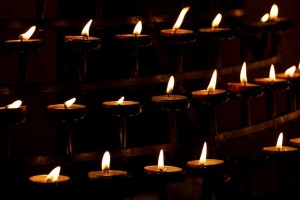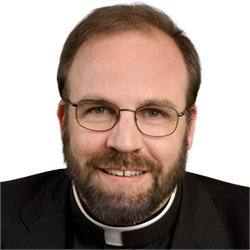“Rejoice! Rejoice! Emmanuel shall come to thee, O Israel.”

Theology of gratitude. Yesterday, on the last day of the “O Antiphons,” the beautiful and ancient recitations made the week before Christmas during Evening Prayer, we implored the Lord, “O Emmanuel, king and lawgiver, desire of the nations, Savior of all people: Come and set us free, Lord our God.” Well, our prayer has been heard. The Christ has come. The chorus of the popular Advent hymn enjoins us to rejoice because Emmanuel, the Savior of all people, has come and set us free. Our joy and exultation arises from this pure gratia (grace)—this undeserved gift. Derived from this notion of gratia is the word gratitude. We rejoice because we are grateful for the gift of Emmanuel, God with us—born to save us. Gratitude is the recognition of grace; it is the acknowledgment of those free and undeserving gifts that we have not earned or merited, but enjoy in our lives. Without this recognition we cannot be grateful this Christmas season, and without gratitude we cannot rejoice. Read More →
 Every one of our churches has individuals who struggle with mental disorder. Which only makes sense, because Jesus came to heal the wounded, right? Church should be a magnet for those who want healing. Jesus is a Mighty Healer. And he wants to use YOU and YOUR CHURCH to accomplish his healing work.
Every one of our churches has individuals who struggle with mental disorder. Which only makes sense, because Jesus came to heal the wounded, right? Church should be a magnet for those who want healing. Jesus is a Mighty Healer. And he wants to use YOU and YOUR CHURCH to accomplish his healing work. A soft golden light, emanating from the hanging, yellowish-gold sconces, illuminated most of the church. The apse was shallow, not extending back very far, it’s vaulted ceiling obscured by a thick, plain, wooden border. The apse was unlit and remained relatively untouched by the light, though the tabernacle was faintly visible in the darkness.
A soft golden light, emanating from the hanging, yellowish-gold sconces, illuminated most of the church. The apse was shallow, not extending back very far, it’s vaulted ceiling obscured by a thick, plain, wooden border. The apse was unlit and remained relatively untouched by the light, though the tabernacle was faintly visible in the darkness. When I was growing up older folks often spoke of a “mid-life crisis.” Hitting forty was usually the critical period they had in mind. These days I’ve noticed it hits a lot sooner. Maybe it’s because we live in a “youth culture” that forces the questions of aging and being successful a lot quicker. Maybe it’s just the stress. But these days, there’s just something about the mid-thirties that hits a lot of folks. I was no exception. My mid-thirties were difficult years for me—years filled with anxiety and self-doubt.
When I was growing up older folks often spoke of a “mid-life crisis.” Hitting forty was usually the critical period they had in mind. These days I’ve noticed it hits a lot sooner. Maybe it’s because we live in a “youth culture” that forces the questions of aging and being successful a lot quicker. Maybe it’s just the stress. But these days, there’s just something about the mid-thirties that hits a lot of folks. I was no exception. My mid-thirties were difficult years for me—years filled with anxiety and self-doubt. Our culture is obsessed with happiness. From a purely individual perspective, happiness seems to be the obvious and ultimate goal. Quite often, the second highest goal is avoiding pain or sadness. Pursue happiness, avoid pain: seems like common sense, right? Too bad its a really poor prescription for actual living.
Our culture is obsessed with happiness. From a purely individual perspective, happiness seems to be the obvious and ultimate goal. Quite often, the second highest goal is avoiding pain or sadness. Pursue happiness, avoid pain: seems like common sense, right? Too bad its a really poor prescription for actual living.
